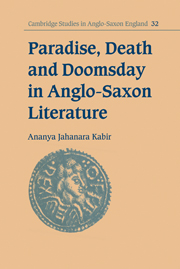Book contents
- Frontmatter
- Contents
- Preface
- List of abbreviations
- 1 Between Eden and Jerusalem, death and Doomsday: locating the interim paradise
- 2 Assertions and denials: paradise and the interim, from the Visio Sancti Pauli to Ælfric
- 3 Old hierarchies in new guise: vernacular reinterpretations of the interim paradise
- 4 Description and compromise: Bede, Boniface and the interim paradise
- 5 Private hopes, public claims? Paradisus and sinus Abrahae in prayer and liturgy
- 6 Doctrinal work, descriptive play: the interim paradise and Old English poetry
- 7 From a heavenly to an earthly interim paradise: toward a tripartite otherworld
- Select bibliography
- Index
7 - From a heavenly to an earthly interim paradise: toward a tripartite otherworld
Published online by Cambridge University Press: 19 October 2009
- Frontmatter
- Contents
- Preface
- List of abbreviations
- 1 Between Eden and Jerusalem, death and Doomsday: locating the interim paradise
- 2 Assertions and denials: paradise and the interim, from the Visio Sancti Pauli to Ælfric
- 3 Old hierarchies in new guise: vernacular reinterpretations of the interim paradise
- 4 Description and compromise: Bede, Boniface and the interim paradise
- 5 Private hopes, public claims? Paradisus and sinus Abrahae in prayer and liturgy
- 6 Doctrinal work, descriptive play: the interim paradise and Old English poetry
- 7 From a heavenly to an earthly interim paradise: toward a tripartite otherworld
- Select bibliography
- Index
Summary
Neorxenewange is upprihte on eastewearde þisse wurlde. Nis þær ne hete ne hunger; ne þær niht nefre ne byð, ac simble dæig. Sunne þær scineð seofen siðe brihtlycor þone on þissen earde. þær wuneð on godes ængles unrim mid þan halgen sawlen oðð domes dæig. þær wuneð on an fugel fæger Fenix gehaten.
This description of paradise occurs in an anonymous prose text preserved in two manuscripts, Cambridge, Corpus Christi College 198, and London, British Library, Cotton Vespasian D. xiv, and is placed in the second half of the eleventh century by its first editor, F. Kluge, who also pointed out, albeit rather non-committally, that the text focused on the phoenix. N. F. Blake called it the ‘Prose Phoenix’ and printed it as an appendix to his edition of The Phoenix, along with a similar text in Old Norse, but did not address adequately the question of the interrelationships of these texts. Indeed, not only this question but the text itself has been all but ignored by recent scholars, despite its potential interest for investigations into the transmission of Old English verse and prose.
Compelling as these issues are, they are raised here insofar as they shed light on the present investigation. Drawing on recent theories of the composition and transmission of Old English, I argue that the ‘Prose Phoenix’ represents the reabsorption of the Latinate poetic tradition into a late Anglo-Saxon, vernacular prose text.
- Type
- Chapter
- Information
- Paradise, Death and Doomsday in Anglo-Saxon Literature , pp. 167 - 189Publisher: Cambridge University PressPrint publication year: 2001



